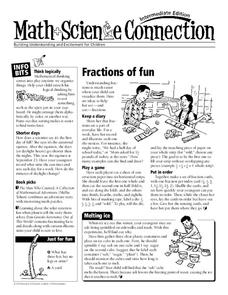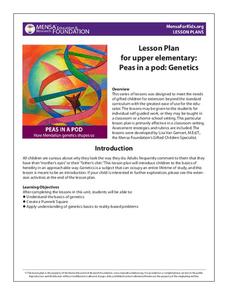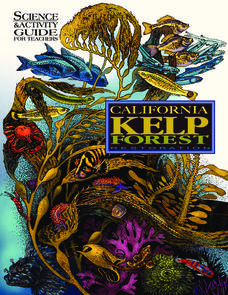Ask A Biologist
Viral Attack
Can you catch the same cold twice? Elementary and middle schoolers learn about what happens when a virus attacks their bodies, and how the immune system never forgets a virus, with an entertaining comic book. The packet includes...
Florida Department of Environmental Protection
Water's Journey Expedition
Step into a scientist's shoes to go online and discover the Florida Springs Expedition, and participate in two activities focusing on how humans impact the environment. The first activity asks scholars to summarize the six dispatches at...
National Nanotechnology Infrastructure Network
The Right Tool for the Job
Is a saw a tool? What about a thermometer? Discover the applications of various tools with a worksheet that accompanies a matching card game. Learners search for tools from a stack of cards and circle its match on their worksheet.
University of Georgia
Land Biomes Project
Challenge scholars to research a biome and create a presentation for the producers of Survivor to choose their ecosystem for the next season's show. The materials include outlines, worksheets, and grading rubrics for individuals as well...
University of California
Energy and Biomass Pyramids
Young scientists play tag as they act out the food pyramid in the ocean ecosystem. Energy circles pass from the smaller prey to the predators and at the end of the activity, a data chart and analysis questions allow pupils to apply their...
Resources for Educators
Fractions of Fun
Reinforce concepts and encourage learner engagement with a collection of math games, science experiments, and cross curricular activities. In one fun resource, learners sort objects, keep a diary of everyday fractions, play a game using...
Curated OER
Candlemaking
There might not be a butcher or baker, but you'll have a class full of candlestick makers after a hands-on instructional activity about candles make from beeswax. After a brief history of where beeswax comes from, young artisans craft...
Education Outside
Creature Jeopardy!
After conducting research on a given scientific animal name, group members take a walk around their school and look for the specified animals in that classification. Then, they come back to their worksheets and create five creative clues...
MENSA Education & Research Foundation
Peas in a Pod: Genetics
Can peas have grandparents? Learn about inherited traits and heredity with a set of activities focused on Mendelian genetics. As your class learns about the process of passing traits along in Punnett squares, they take on the role of...
Kenan
Respiratory System
Explore the respiratory system with a model. First, pupils build a set of lungs to experiment how they inflate and deflate. Then, they delve deeper into the topic with a web quest to discover new information about the nose, trachea, and...
MENSA Education & Research Foundation
Ecosystems
Explore the Earth's different ecosystems through four lessons, an assessment, and extension activities. Lessons include informative text and step-by-step instructions to apply knowledge in interactive, and thought provoking ways; such as...
MENSA Education & Research Foundation
Kingdom Animalia: Classifying Animals
Six lessons, extension activities, and an assessment make up a series of lessons curated to reinforce the concept of classifying animals. Each informative and interactive lesson attributes to the knowledge of the seven levels of...
WindWise Education
Can We Reduce Risk to Bats?
It is just batty! A resource outlines a case study scenario of reducing the risk to bats. Teams learn about the bat populations in the area of the wind farm, then research and propose a solution.
WindWise Education
What is Wind Power's Risk to Birds?
How is risk determined? Through the use of a reading passage, individuals or groups learn about bird interactions with man made structures along with wind turbines. Pupils use information from the second reading passage to conduct an...
Curated OER
Genome: The Secret of How Life Works
What do you have in common with a fruit fly? About 60 percent of your DNA. The resource, divided into two units, is intended for grades four to eight and another for high schoolers. Both units include eight lessons covering the genome as...
University of Florida
Investigating the Fungus among Us
What do you call a fungus that writes music? A decomposer! Here, young biologists explore fungus by tasting fungus (blue cheese) to creating art with fungus to playing a board game centered around, you got it, fungus. Surprise scholars...
National Park Service
Biodiversity—Bee Week
If you want scholars to fall in love with bees, this is the unit for you! Celebrate bees with a full week of material—designed for the Next Generation Science Standards—that addresses the importance of pollination and fertilization....
America's Blood Centers
My Blood, Your Blood
Dracula isn't the only one who needs blood to survive. The eight-part unit includes seven lessons, five demonstrations, seven labs, and a project to organize a blood drive. Class members learn about the parts of blood, the form and...
Science Friday
Microorganisms on the Move
You can't b. cereus until you see this lesson! Young microbiologists learn to prepare deep well slides, observe two types of microorganisms, and compare and contrast their physical characteristics in this interactive and lively activity.
National Wildlife Federation
What's Your Habitat?
How are third graders like rabbits? They both live in habitats and require food, water, and shelter to survive! An educational science instructional activity encourages your learners to think about their own habitats and survival needs,...
MENSA Education & Research Foundation
The Cell: the Building Blocks of Life
Do you have early finishers asking what they can do next, or any budding scientists eager to learn more about plant and animal cells? Then here is a cell unit for you! The packet provides scholars with everything they need in order to...
Early Childhood Learning and Knowlege Center
My Body My Senses
In a comprehensive unit of activities, learners explore the five senses. Youngsters discover the many different body parts and their functions that allow humans to have sense of sight, touch, smell, taste, and hearing. The best way to...
Science Friday
Ugh, a Bug!
Young entomologists familiarize themselves with the physical characteristics of insects. Composed of two activities, each lesson involves your scientists tapping into their prior knowledge of bugs and making observations of real live...
Dawn N . Ericson
California Kelp Forest Restoration
This unit is so cool, you won't be able to "kelp" yourself! Intended for all grades, this science and activity guide for teachers offers a unique opportunity to understand kelp's role as a valuable ecological resource. Teachers and...

























